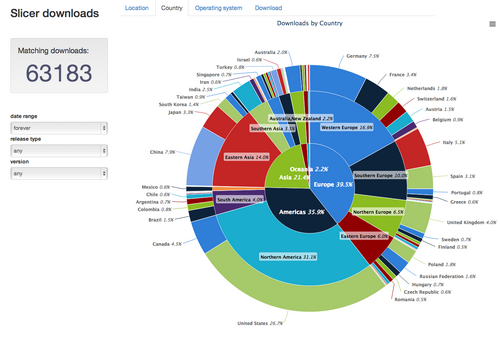Difference between revisions of "2014 How about the Future"
From NAMIC Wiki
| Line 20: | Line 20: | ||
=What we have accomplished= | =What we have accomplished= | ||
*Created an outstanding scientific and engineering community in the field of [http://en.wikipedia.org/wiki/Medical_image_computing Medical Image Computing] (MIC). | *Created an outstanding scientific and engineering community in the field of [http://en.wikipedia.org/wiki/Medical_image_computing Medical Image Computing] (MIC). | ||
| − | *Investigated novel algorithmic approaches: Particle systems, registration algorithms, segmentation algorithms, | + | *Investigated novel algorithmic approaches: Particle systems, registration algorithms, segmentation algorithms, software engineering methodologies |
*Created the NA-MIC kit, a free open source platform for MIC and the basis for 3D Slicer. | *Created the NA-MIC kit, a free open source platform for MIC and the basis for 3D Slicer. | ||
*3D Slicer is today a platform with worldwide impact. | *3D Slicer is today a platform with worldwide impact. | ||
Revision as of 00:12, 8 January 2014
Home < 2014 How about the FutureBack to AHM_2014 Agenda
What we have accomplished
- Created an outstanding scientific and engineering community in the field of Medical Image Computing (MIC).
- Investigated novel algorithmic approaches: Particle systems, registration algorithms, segmentation algorithms, software engineering methodologies
- Created the NA-MIC kit, a free open source platform for MIC and the basis for 3D Slicer.
- 3D Slicer is today a platform with worldwide impact.
Highlights
- Robust algorithms for segmentation in the face of anatomical variability: label fusion
- Comprehensive toolbox for the analysis of individual and population DTI data
- The predominant shape analysis toolbox in the field/used in clinical papers(SPHARM-PDM)
- A novel framework for modeling brain connectivity networks
- Robust pipeline for processing clinical brain images
- Automatic 4D segmentation of longitudinal brain MRI in severe TBI
- NAMIC researchers take lead in novel spatio-temporal image and shape analysis methodologies (Whitaker, Styner, Gerig, Tannenbaum and colleagues)
Where we go from here
- Project week will continue.
- 3D Slicer 4 will continue.
- The remaining months of NA-MIC funding will be used to improve the stability of Slicer and simplify the submission of extensions.
Grants
- Grants that will allow continued participation in the community after the NIH mandated sunset for NA-MIC in June 2014.
- NAC funded through 2018. Ron Kikinis
- QIICR funded through 2018. Ron Kikinis, Andrey Fedorov
- "An Open Source Software for Proton Treatment Planning," NCI/Federal Share Grant C06-CA059267 funded through Dec 2014, Greg Sharp
- 4DShape"4D Shape Analysis for Modeling Spatiotemporal Change Trajectories in Huntington's" (NINDS, 07/01/12- 06/30/15) PIs Gerig/Fletcher Utah, co-investigators Johnson/Paulsen Iowa
- NA-MIC Collaboration R01 (NIDCR) on "Quantification of 3D Bony Changes in Temporomandibular joint osteoarthritis", PI Cevidanes/U Michigan, co-investigators Martin Styner/Beatriz Paniagua/UNC, Steve Piper
- Several other grants are being worked on
Software
- 3D Slicer
- Other packages and Slicer extensions
- "MABS," an end-user software for multi-atlas segmentation, Greg Sharp
- "SPHARM-PDM", an end-user software for shape analysis, also including group-wise based particle correspondence, Martin Styner
- "DTIPrep", Comprehensive DWI/DTI QC tool, Martin Styner
- "DTIAtlasBuilder", DTI co-registration and atlas building software, Martin Styner
- "DTIAtlasFiberAnalyzer", DTI fiber profile statistics generation, Martin Styner
- "FiberViewerLight", DTI fiber processing & clustering software, Martin Styner
- "CARMA Cardiac MR Tookit", Cardiac MRI segmentation and quantification software, CARMA Center
